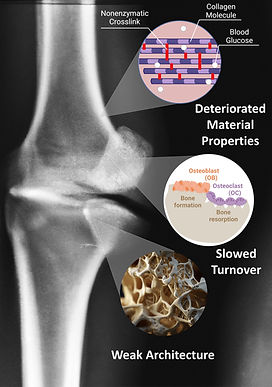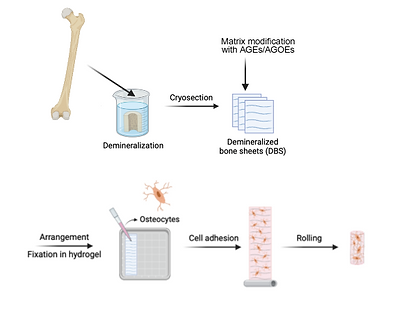VASHISHTH LAB
Research Projects
Our Current Focus

Effects of Advanced Glycation Endproducts on Type 2 Diabetic and Fragility Fractures
We focus on how non-enzymatic glycation affect bone material properties in diabetes and other disease conditions. Specifically, carboxymethyl-lysine (CML), a non-fluorescent advanced glycation end-product produced due to hyperglycemia and lipid oxidation, has been identified as a new and relevant biomarker of diabetic fracture that captures the effects of both hyperglycemia and oxidative stress in bone and explains the susceptibility of bone to fracture in diabetes. In this project, we investigate the mechanism and the effects of CML and other AGEs on bone fractures leading to new strategies to predict, manage and mitigate T2D and fragility fractures.
Alzheimer's Disease, Bone Health and Microbiome
Alzheimer’s disease is a neurodegenerative disorder characterized by protein buildup of amyloid-β (Aβ) and/or tau. Alzheimer’s disease patients commonly present with osteoporosis and show gut dysbiosis. Here, we are investigating the bone-brain-gut association, where altered bone quality and imbalanced microbiota occur in concert with the progression of Alzheimer’s disease.


Current standard of care tools, based on bone mineral density (BMD), underestimate the increased fracture risk in people with type 2 diabetes (T2D). In T2D, bone tissue is negatively impacted by persistent hyperglycemia and oxidative stress. Therefore, we are evaluating clinically measurable biomarkers which capture the glycoxidative damage on bone tissue, in order to improve fracture risk prediction and subsequent management and care in T2D.
Microstructurally Tailored Osteocyte-Based Bone Organoids
Osteocytes, the most abundant and mechanosensitive cells in bone, rely on an intact mineralized matrix, canalicular network, and cell–cell signaling to maintain skeletal homeostasis. To replicate the matrix-dependent communication that governs their function in an in vitro model, we aim to produce a physiologically informed 3D osteocyte-based bone organoid and demonstrate its functionality in disease modeling and therapeutic evaluation by selectively altering the architecture and matrix composition associated with osteocyte dysfunction in aging and metabolic bone diseases.
